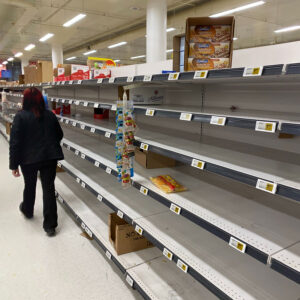It is strange how complacent the default position of UK food policy is. It’s a legacy of the UK’s imperial past, in part. But not just that: there’s also a current political economy rationale that warrants better and critical scrutiny by analysts, and not just for the UK. Nor can this complacency be dismissed as ‘ignorance’ of ordinary people who have grown used to supermarketisation and shelves always groaning with food – despite some truth in that.
The litany of arguments given to justify confidence in UK national food security is long.
One school of thought is what we should simply call ‘the optimists’. Someone else will always be around to feed us (‘us’ being the Brits in this case). One can always buy food on world markets. There are hundreds of millions of people desperate to market their food produce. There’s no need for anxiety. There’s plenty of food. Indeed, there is. There’s an overproduction problem, if anything.
But as a policy, this is the food version of Leibniz’s early 18th-century philosophy and its wondrous ‘Principle of the Best’ that the existing world is the best of all possible worlds. His dictum might have made sense of religious orthodoxy, though Diderot and others scorned it then, but it doesn’t fit food normality today. That said, it’s a powerful argument, and many food analysts argue there’s been major progress in feeding the world. To them, I’d simply say that the modern food system is more stretched than its optimists admit.
Another is the ‘hard economics’ school. Liberals may regret it, but the brutal truth is that food follows the money. The UK is a rich country. Declining, maybe, but still sixth richest. So whatever happens elsewhere, we’ll be alright. Here again, reality suggests otherwise. A welter of studies, including from the Food Standards Agency and the Food Foundation, remind us that a country might be rich but large sections of its people might not be. And when incomes are squeezed, food gets cut. Thus food banks complain they cannot cope with raised demand. FareShare has been begging Government for a £25m grant to buy more food but is being ignored. In short, the market – if food poverty alleviation deserves that name – is not working.
Then there is the ‘trade pragmatist’ school. In an economy where nine retailers have 95.2% of British food sales, we can safely leave food security to Tesco et al. They sorted Brexit and Covid, so they’ve passed the test. There’s no need to trouble consumers. Prices may fluctuate a bit, but there’ll be stuff on the shelves.
I note these arguments, and more, of course. Yet I am struck how since Russia invaded Ukraine, and then gas and thus fertiliser prices rocketed, more people in the food sectors (let alone among politicians and policy watchers) are privately voicing concerns. The Food and Drink Federation’s State of the Industry report has charted what its CEO called the ‘rock bottom’ confidence in current resilience. And the report doesn’t even mention environmental or health pressures crowding what industry does.
For decades, the retail industry’s magazine The Grocer has run a weekly ‘availability’ score. Anonymous sleuths check whether a standard 33-item grocery basket is available in retail outlets. Four years ago availability averaged 97%. In late November it was down to 91-92%. You might say ‘who cares?’, and 90% availability would be nirvana to many a developing country. Anyone who knew the old Soviet Union knew it like that. (If you want to get a glimpse of that harsh retail reality, watch the excellent 7-part Adam Curtis Traumazone series of excerpts from BBC filming in the last days of Communist USSR now available on BBC iPlayer.)
I’m not even rehearsing the theme explored in previous Field Notes that price volatility is the new normal, or that we’ve built a mode of food production to consumption which opens itself to cyber insecurity (all that microchip dependency), or even that the accelerating ecosystem pressures are fraying the confidence in how western and industrialised food systems work.
What’s denting the level of confidence in business-as-usual is the Ukraine effect. It’s the realisation, as I argued in my Feeding Britain book, that we ignore the significance of food defence, i.e. being prepared to defend food supplies by building social resilience around food. If people see themselves as passive recipients or consumers, and there are no other pathways for access to food, social cohesion can fray.
Do you really know how your food gets to you? What if it’s disrupted in a major way? Sure, I want traders and ports to have capacity to protect food flows everywhere, but what if they stop? What if food systems become themselves a terrain of harsh politics?
Companies, governments and analysts these days all talk of ‘resilience’ without there being much agreement on what’s meant. Like sustainability, the word suffers from meaning all things to all people. Its origins lie in physics: a capacity to bounce back after shock. Ecologists adopted it for ecosystems. I’m interested in applying it to societal resilience. Just how socially resilient about food are the Brits or your country? What level of shock could be adapted to? Hurricanes? One-off floods? A doubling or quadrupling of food prices? Are the institutional structures to help fit for (social resilience) purpose?
We should not conflate public happiness, if and when food prices return to business-as-usual, with resilience. The Food Standards Agency’s regular monitoring of public confidence in food suggests lack of confidence in food availability – a key factor in food insecurity metrics – has risen to 55% of the population, while 81% are troubled by rising food prices.
This is not a sign of ebullient confidence but wary unease. The policy question is: what can be done about it? So far, there’s silence from Westminster politics. Food is largely ignored. But, as often happens, perhaps the people are in advance of the politics.

